Chauvin Pre-Trial Day 5: Seventh Juror Seated
State & Defense each burn peremptory, leaving 4 and 7, respectively
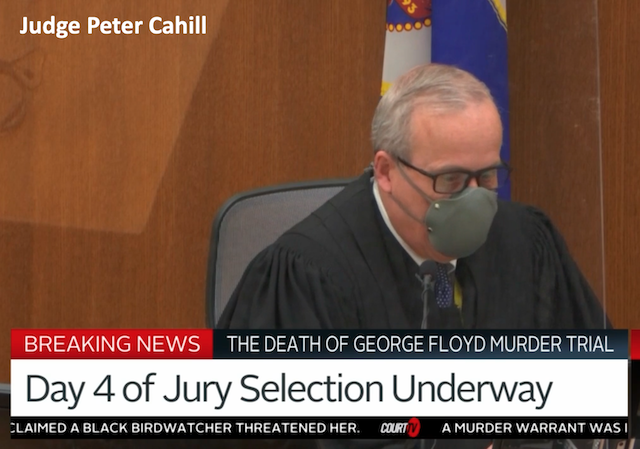
Welcome to our ongoing coverage of the Minnesota murder trial of Derek Chauvin, over the in-custody death of George Floyd. I am Attorney Andrew Branca for Law of Self Defense, providing guest commentary and analysis of this trial for Legal Insurrection.
As a reminder, I am “LIVE Parlering” the trial in real-time over at my Parler account, which you can find using my Parler handle: @LawofSelfDefense.
Today the court moved through six prospective jurors: #42, #43, #44, #46, #48, and #49.
Two of these essentially took themselves out of the running when they professed exceptional difficulties in being able to serve without hardship–#46—or claiming both hardship and firmly established opinions against the defendant–#49. Prospective juror #43 was also excused for some unexplained reason, and was never questioned on open microphone.
Another two prospective jurors were removed by peremptory strikes, with the defense burning a challenge on #42, and the state burning a challenge on #48. More on these two below.
Prospective juror #44, however, was satisfactory to both the defense and the state, and was seated as the 7th member of the jury. More on her below, as well.
Juror #42: Stricken by the Defense
Prospective juror #42 was a young-sounding female, a recent college graduate who described herself as a “genuine person” who looks for “true friendship.”
When asked by the defense if she’d ever in her personal or professional life been in a position where she had to resolve which of two sides in an argument was more likely telling the truth, she said she never had been—which seemed odd for an adult to say.
When asked defense about evidence that might appear “very clear,” #42 indicated that she would give very clear evidence—such as a video in particular—more weight than she would witness testimony.
Asked by the defense if she’d ever had the experience of believing she was 100% right about something only to learn later that she’d been mistaken, #42 said she’d never had such an experience—which, again, seemed odd for an adult to say.
When asked if she would be able to apply the law as instructed, even if she thought the law was wrong, #42 claimed that she would.
So far so good, but as we’ve seen before the wheels began to come off #42 when the defense turned to her juror questionnaire.
When asked her opinion of Chauvin in the questionnaire she had responded somewhat negative, which is not too concerning for the defense, but then wrote out “Chose this because it went on so long,” meaning Chauvin’s knee on Floyd’s neck.
Asked to explain in court today, #42 told the defense, “from what I saw, as a human, it did not give me a good impression.” The “human” reference would have been particularly alarming to the defense, as one must presume #42 would never view the video as a non-human.
As the defense explored #42’s perception of the video further, she agreed that it was her perception that Chauvin had treated Floyd in a manner that was inhumane.
Juror #42 also had an inflexible belief in the need for “police reform”:
She also testified to having participated in BLM marches:
In exploring her views that blacks and other minorities do not receive equal treatment as whites in the criminal justice system, she based this belief on “what was shown in the world this past year,” also suggesting inflexibility on this issue:
She also testified that she’d had friends who had been mistreated by the police, but only friends who were people of color, which I took to indicate that she believed that the mistreatment was racially based:
Perhaps most alarming about #42, however, was her apparent belief that her service on the juryr would be a mission in pursuit of some greater good. In her juror questionnaire, when asked if she wanted to serve on the jury, she responded that she did, and added:
“I am a recent college grad, and I believe there’s a reason for everything, this is a global case and it’s important to put everything aside and be present for this trial.”
When pressed by the defense, #42 insisted that she could be a fair and impartial juror on the case, compelling the defense to burn an eighth peremptory strike to remove her. This leaves the defense with seven remaining peremptory strikes.
Here is the voir dire of #42:
Juror #48: Stricken by the State
Prospective juror #48 was a male who had previously served 8 years in the Army Reserve in a maintenance company, and who had at one point been deployed to Iraq as a sergeant (E-5). He’s currently in a management position working with diverse colleagues. He describes himself as easy going, with a good sense of humor, and a wife and small kids at home.
When asked by the defense if he’d ever had to resolve disputes between others he indicated he had, and that his process was to understand where both sides were coming from, use his experience, and gather additional sources of information on the issues in dispute. In other words, essentially the job description of a juror.
When asked by the defense if the community had been negatively or positively affected by the events around Floyd’s death, #48 indicated that he thought both were true:
He also distinguished between peaceful protests and rioting, but noted that they often seemed to blend into each other:
Asked by the defense if he thought blacks and whites were treated differently by the criminal justice system, #48 somewhat disagreed based on his own personal experience.
Asked by the defense if police in his community made him feel safe, he somewhat agreed, indicating that the police do make him feel safe and that he had no concerns about police.
Asked his opinion on demands to defund the Minneapolis Police Department, he somewhat disagreed, and explained that he didn’t really know what that policy actually sought, and also that people advocating for that policy themselves don’t appear to fully understand the ramifications:
Asked by the defense if, because of their dangerous jobs, police officer decisions on duty ought not be second guessed, he wrote in his questionnaire that he somewhat agreed.
He explained today that what he meant was that, based on his own personal training experience in the military, he imagined that police training and practices might involve conduct that looked very negative to untrained observers but which might be perfectly normal.
He did, however, acknowledge that sometimes police did need to be questioned.
When asked on the questionnaire whether he wanted to be a juror on this case, he had indicated that he was unsure, primarily out of concern for publicity and possible safety of himself and his family. That remains true, although he was fully willing to serve on the jury if chosen.
Ultimately the defense passed for cause, meaning the defense found #48 to be an acceptable juror.
At that point Prosecutor Schleiter took over questioning of #48 for the state.
Schlieter seemed particularly concerned about #48’s awareness that untrained observers might negatively misinterpret conduct by trained persons, as well as that being informed about that training might be necessary for that observer to properly understand what they had seen:
Schlieter was also concerned by #48’s description of the Floyd video as “very quick and stressful,” as well as #48’s belief that he would need more context about what led up to the event in order to have an informed opinion:
#48 had also indicated that one of the factors increasing the stress of the situation for the officers involved was the crowd that grew at the event, and their shouting at the officers.
This would be a particular sore point with Schleiter, as the state will certainly call some of that crowd as witnesses, and they would not want a juror who believed that those witnesses had actually contributed negatively to the event.
That was enough for Prosecutor Schlieter, who used a peremptory strike to remove #48 from the jury pool. This leaves the state with four remaining peremptory strikes.
Here is the voir dire of #48:
Juror #44: 7th Member of Jury
The voir dire of prospective juror #44 actually took place prior to the of #48 (as the numerical sequence suggests), and she was questioned by the defense prior to lunch and by the state immediately afterwards.
Prospective juror #44 was a woman who was described as a C-level executive working in a healthcare-related non-profit, and who saw her mission as improving her community’s healthcare and the life of others generally.
In that role she’d apparently had previous positive contact with Attorney General Ellison, although nobody appeared to see any reason why this should disqualify her as a juror. She’s also the single mother of two teenagers in high school.
Asked by the defense about her initial reaction to knowing she was a potential juror on this case, she responded that she was “kind of terrified” given the high profile of the case:
She expressed that she was not so much worried about physical safety as about the possibility of harassment, given how high emotions are running in this case. She also noted that anyone who claimed they weren’t worried about this possibility was lying.
In many respects, #44 seemed well suited as juror, from a thought-process perspective.
She acknowledged the importance of knowing both sides to any dispute, gathering additional information when available, and recognized that it was normal for people to have different views of the same matter.
She also acknowledged that she had to arrive at a verdict based on the evidence shown in court, and not what she might have learned elsewhere. Remarkably, she several times referenced her belief that the media was biased generally.
Prospective juror #44 also acknowledged that while what she saw of the video of Floyd’s death created a negative impression for her of Chauvin, she was aware that she doesn’t know the laws and procedures for police detaining a suspect.
She noted also that Floyd dying was surely not the intended endpoint for police procedures, and also expressed the belief that none of the officers involved in this event went into it planning that Floyd would die.
She also noted that the police in her community contribute to her safety, and appeared to have no negative perceptions of the police generally.
However, she also had definite opinions on systemic discrimination and racism.
Asked if media exaggerated discrimination, she believed it did, but also expressed the belief that blacks and native Americans have been disenfranchised by outdated laws and policies, although she put this down primarily to a consequence of implicit, rather than explicit, discrimination.
Interestingly, #44 mentioned Native Americans multiple times, and at one point used the racial term of art “BIPOC” which I understand to mean “black and indigenous people of color.”
Ultimately, the defense passed on cause for #44, meaning they found her acceptable as a juror.
Prosecutor Schleiter once again handled the voir dire for the state.
When he explored #44’s slight disagreement with defunding the Minneapolis Police Department, she re-affirmed her position that the police helped her feel safe:
She also seemed to have a genuinely open mind on the question of whether Chauvin and the other officers involved in Floyd’s arrest were acting with malice. Indeed, she presumed that they were not acting with malice.
She also indicated that she would have a generally lower opinion of a person if she learned they used illegal drugs, mostly because doing so was a poor life decision.
Despite this, Schleiter also passed on cause, meaning the state found #44 acceptable as a juror.
As a result, #44 became the 7th juror seated on this case.
Here is the voir dire of juror #44:
OK, folks, that’s all I have for all of you today, and for the weekend. We’ll be back to our live coverage of Minnesota v. Chauvin when court resumes with jury selection on Monday at 9:00am CT.
Until next time, stay safe!
–Andrew
Attorney Andrew F. Branca
Law of Self Defense LLC
Attorney Andrew F. Branca’s legal practice has specialized exclusively in use-of-force law for thirty years. Andrew provides use-of-force legal consultancy services to attorneys across the country, as well as near-daily use-of-force law insight, expertise, and education to lawyers and non-lawyers alike in the form of blog posts, video, and podcasts, through the Law of Self Defense Membership service. If this kind of content is of interest to you, try out our two-week Membership trial for a mere 99 cents, with a 200% no-question- asked money-back guarantee, here: Law of Self Defense Membership Trial.
[Featured image is a screen capture from Court TV video of today’s court proceedings in MN v. Chauvin.]
 DONATE
DONATE
Donations tax deductible
to the full extent allowed by law.



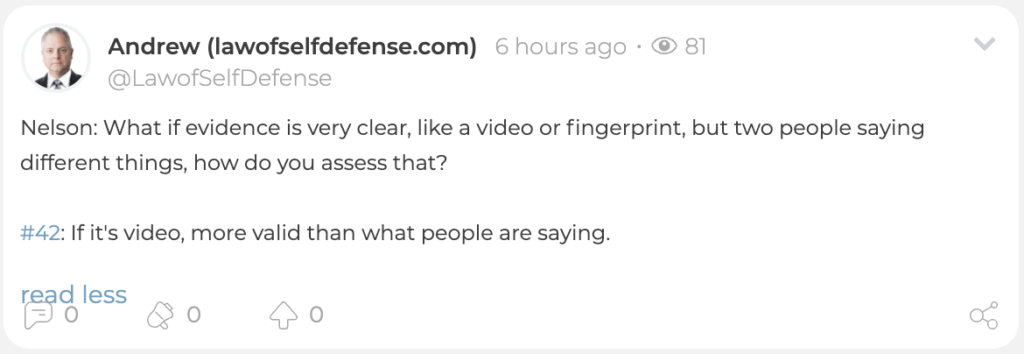


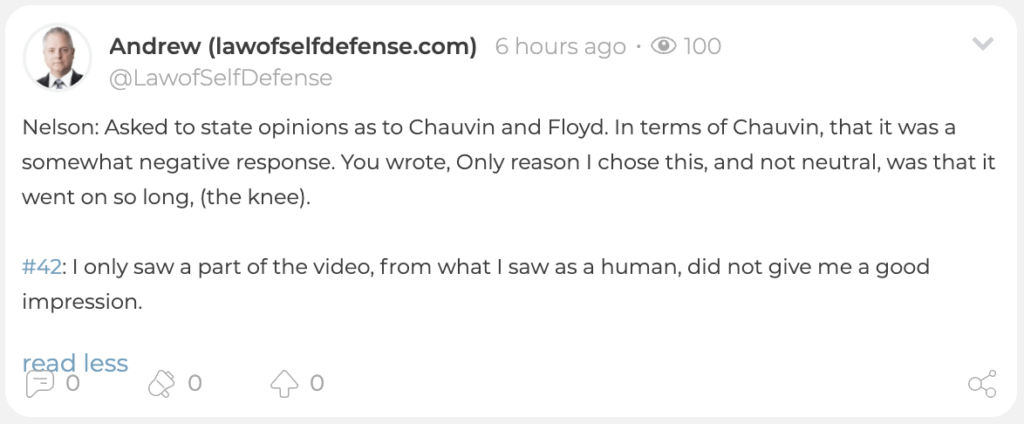




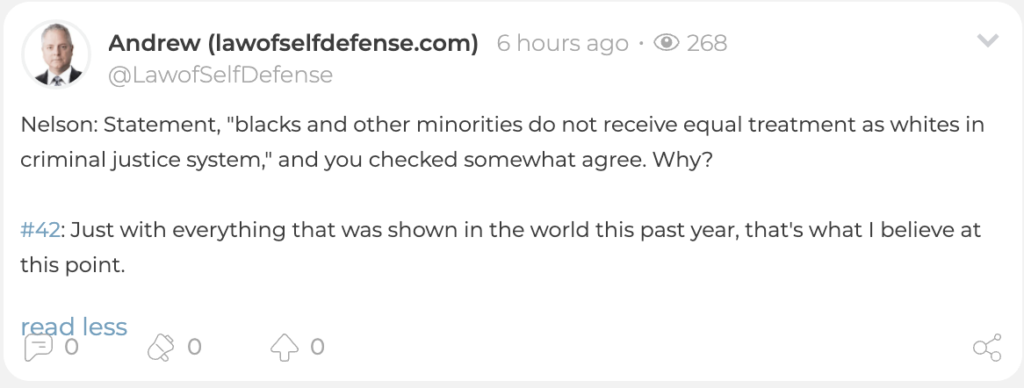

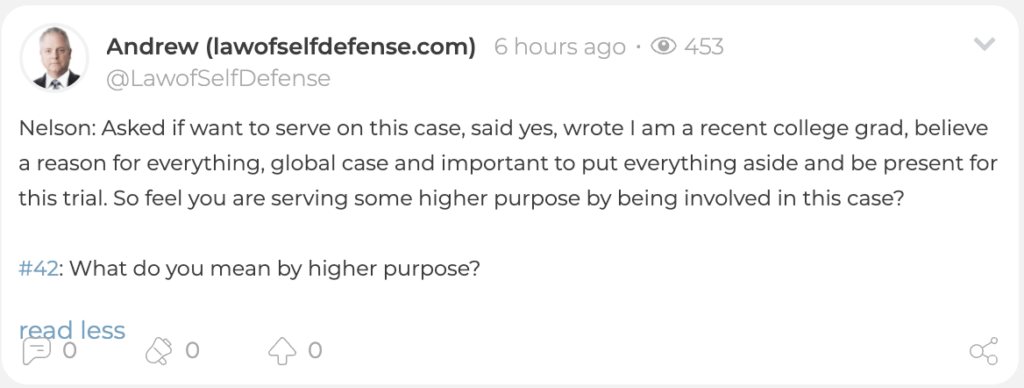

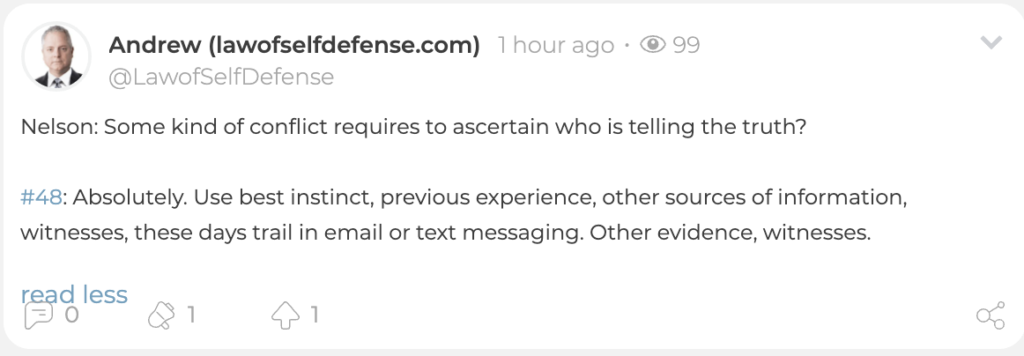
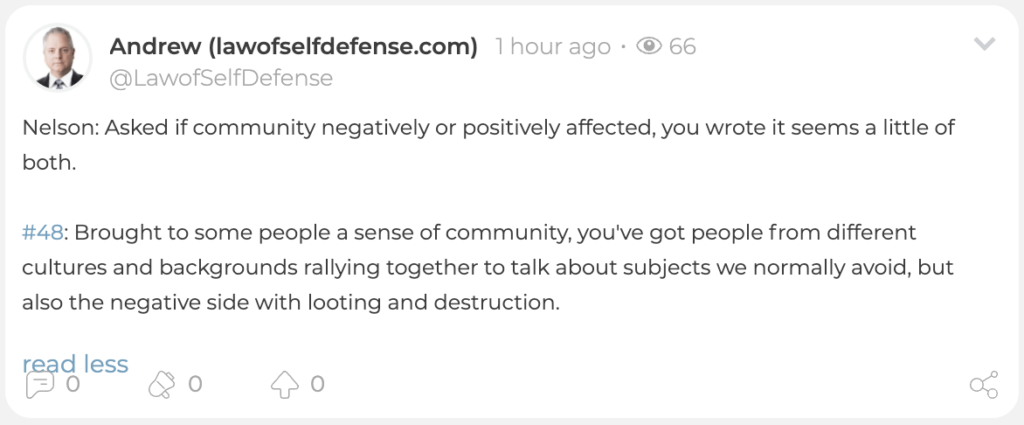
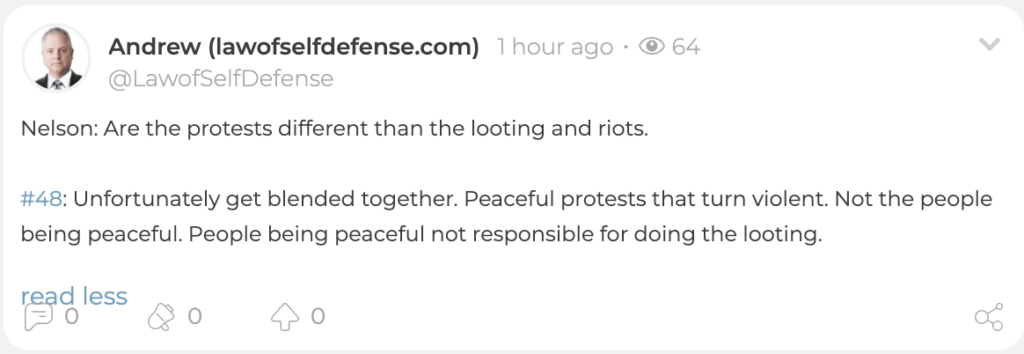


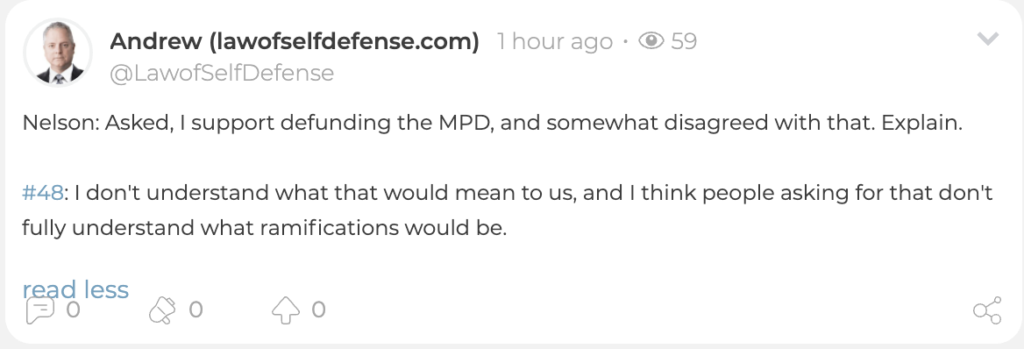
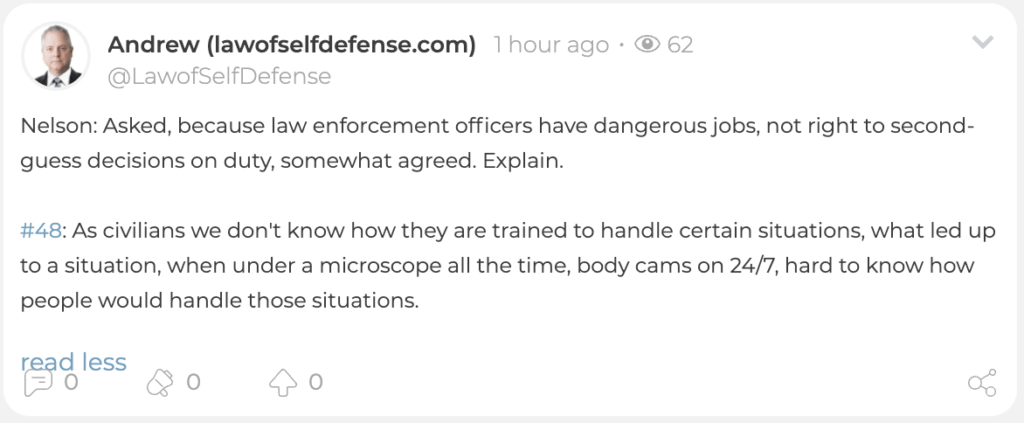
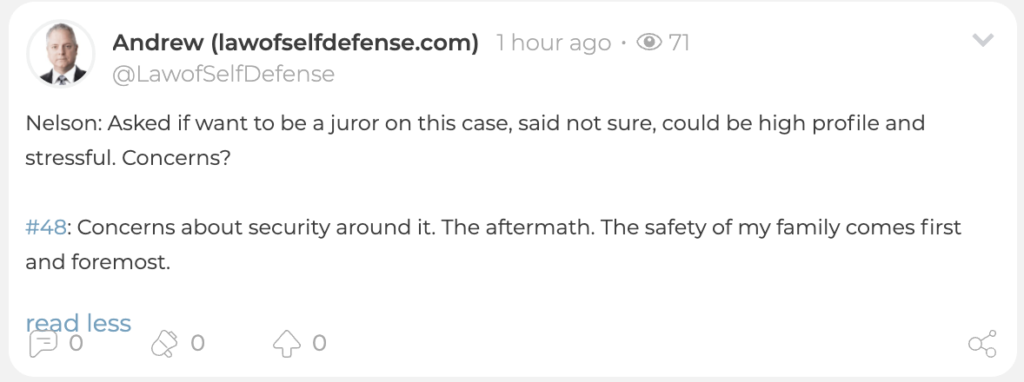
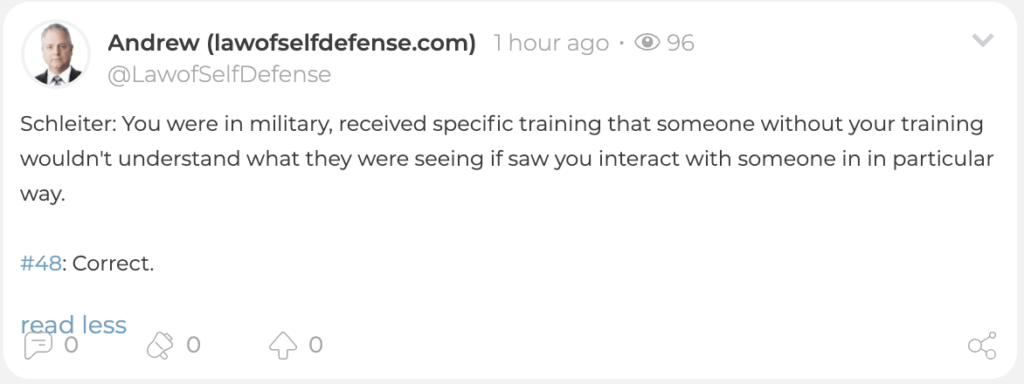


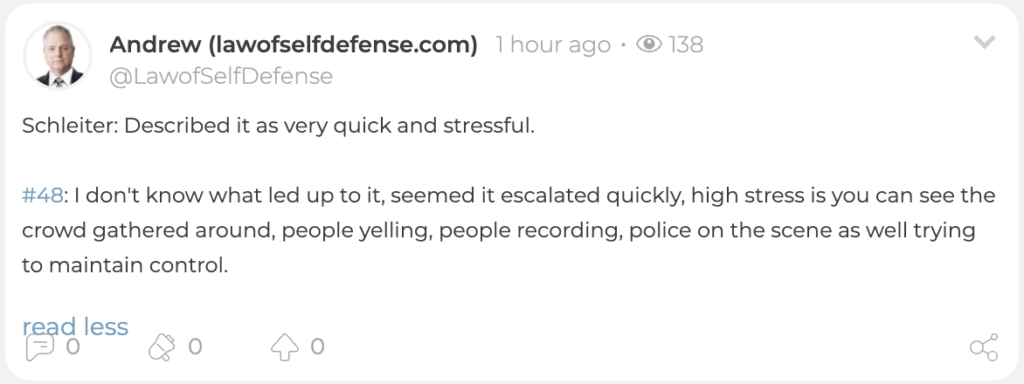
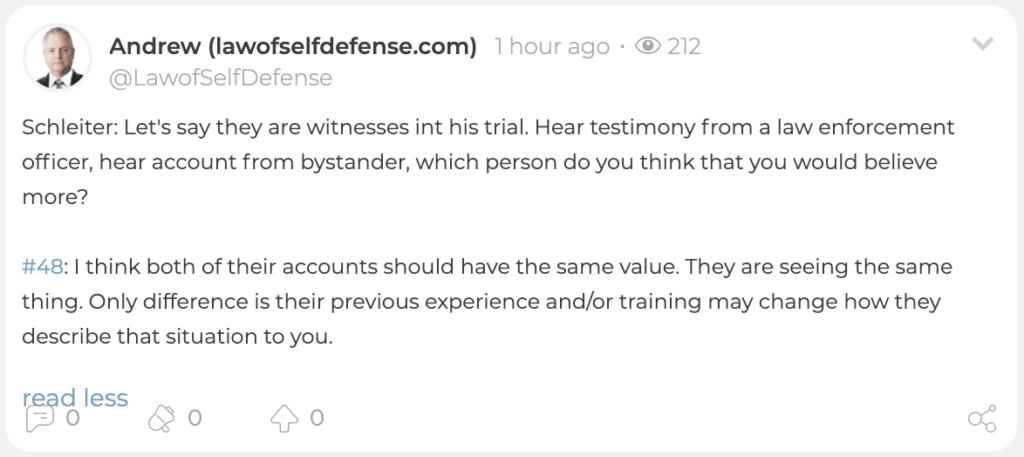
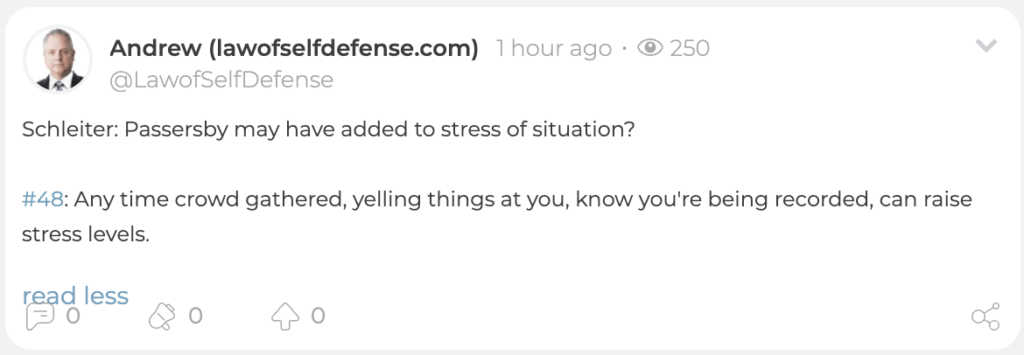
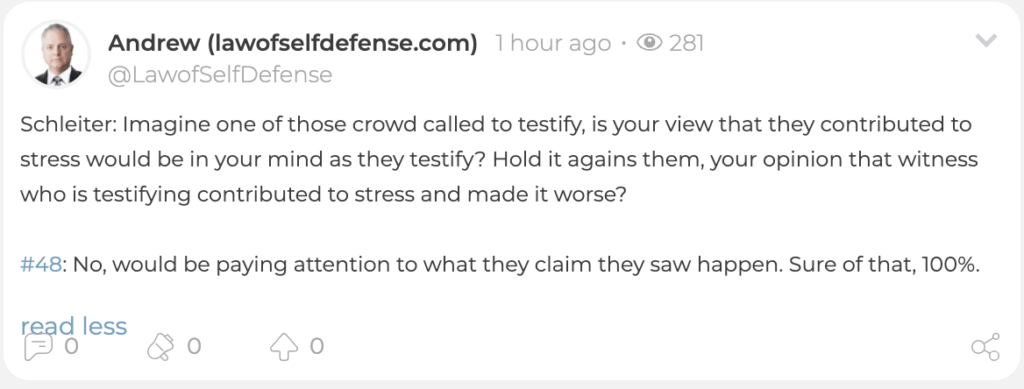
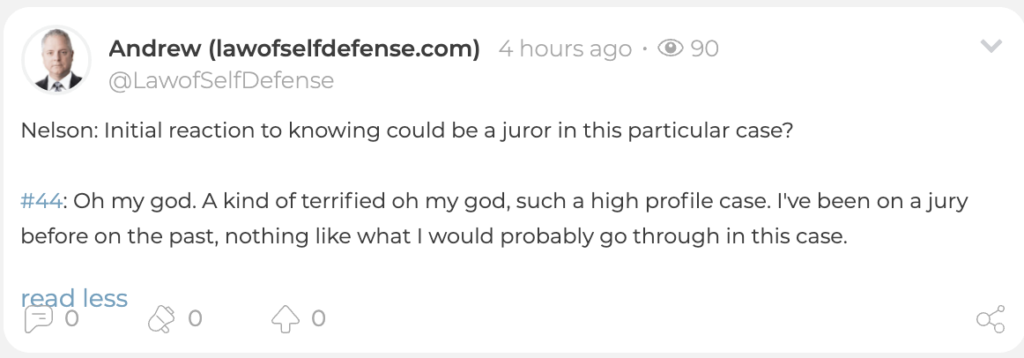


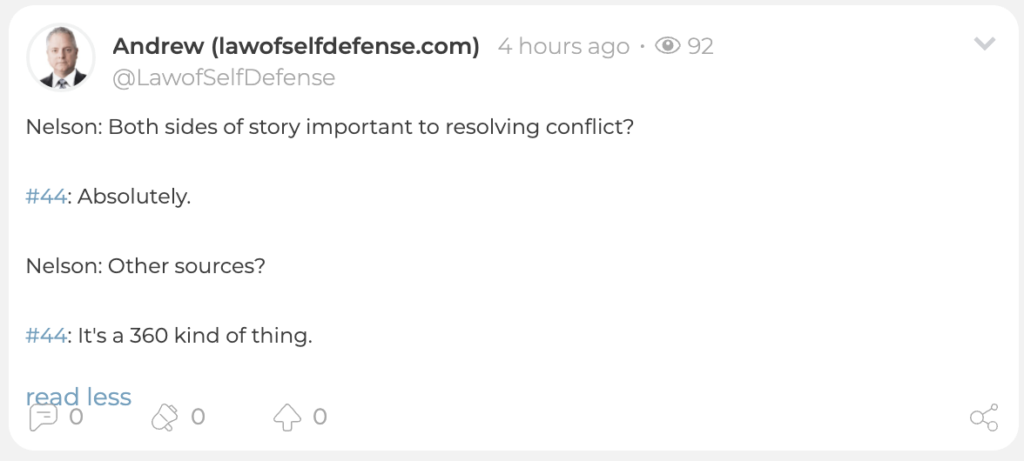


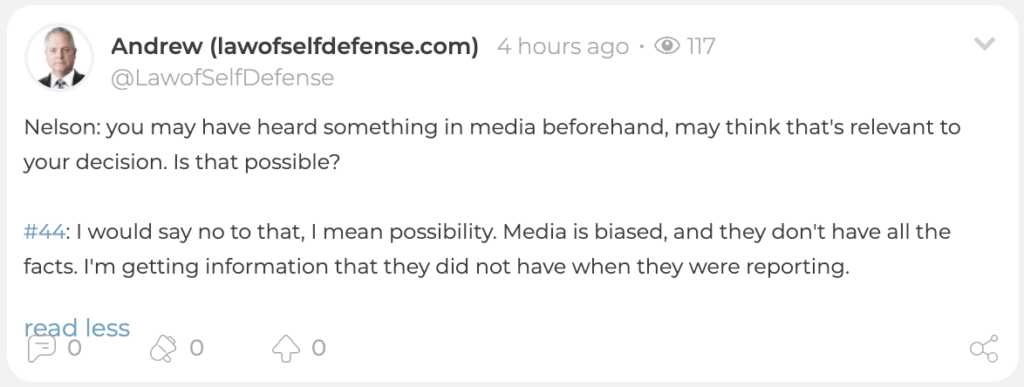

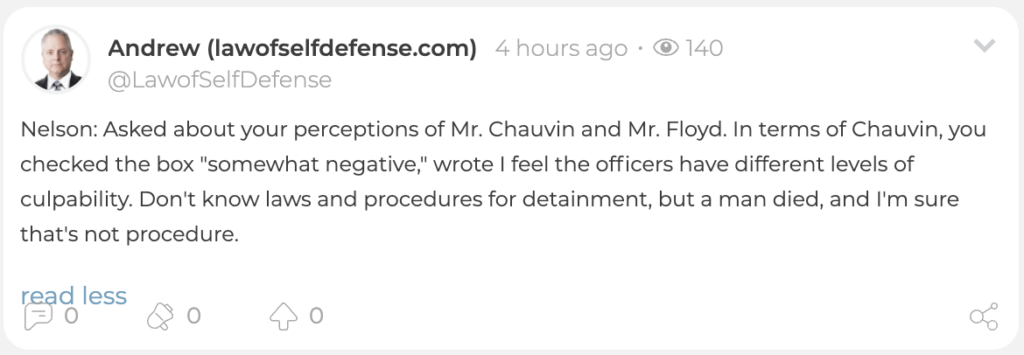




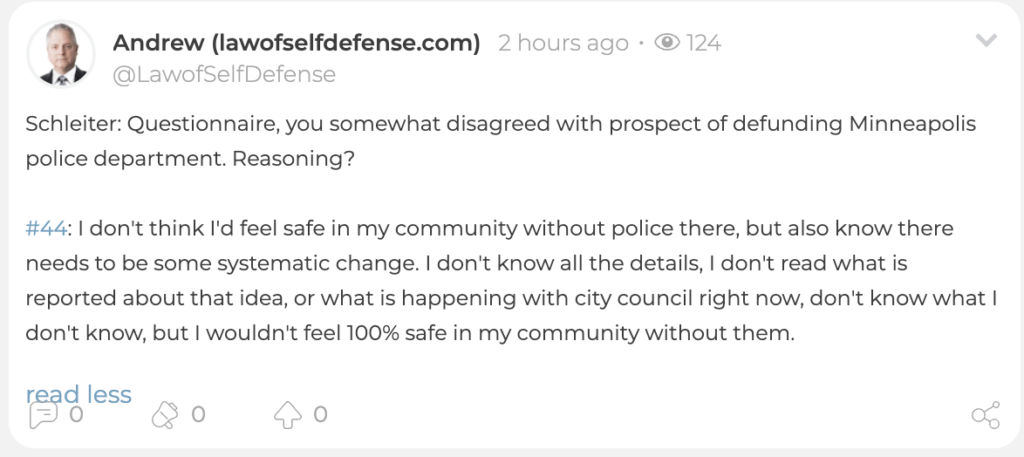

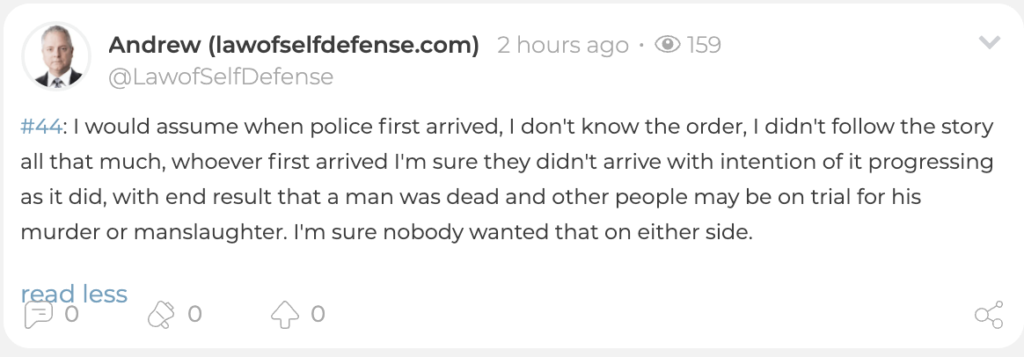
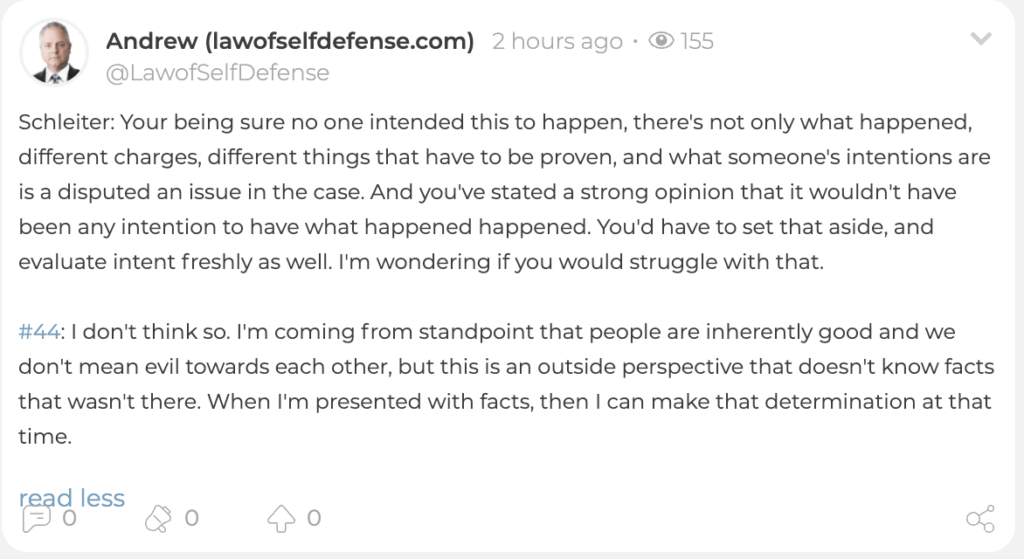
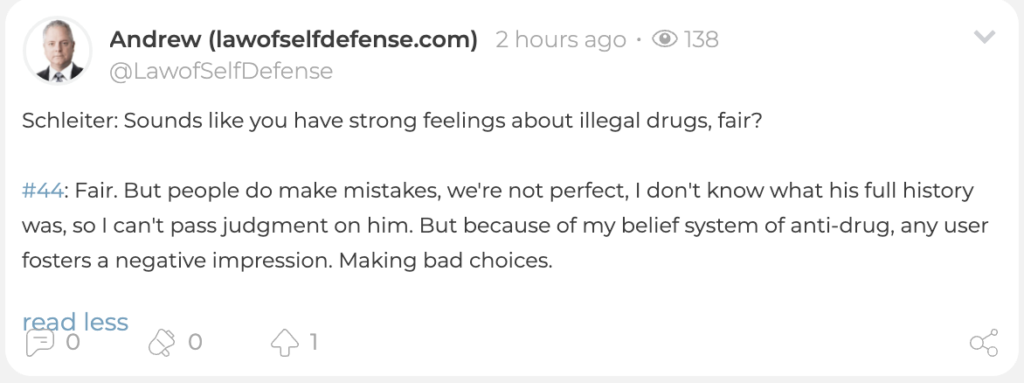







Comments
Does the defense always question the prospective juror (and have to make a decision on whether to challenge) before the state?
Andrew–What do you think about the impact of the settlement of the civil case for 27 million on the defendant’s ability to secure a fair trial. I have seen several people opine that it pretty automatically requires a mistrial and change of venue.
I think the city is trying to buy itself out of riots. It won’t work.
I think you’re right, I also think they want to influence the trial, which is worse.
Nope.
Respectfully disagree based on State v. Salas (Minn. 1981) 306 N.W.2d 832, 833.
” Factual news reports are insufficient to establish that pretrial publicity was prejudicial. Opinions or implications of the defendant’s guilt are required, and these are absent from the news reports involved in this case.” State v. Salas (Minn. 1981) 306 N.W.2d 832, 833.
Factual news reporting that leads to opinions or implications regarding the defendants guilt are sufficient to result in the denial of a fair trial and thus a deprivation of due process.
You need to re-read what you cited, as your re-telling of the citation is not what it actually says. Just because something is “required” doesn’t mean it’s “sufficient.” An internal combustion engine car “requires” fuel to run, but remove the motor and all the gas in the world won’t get you to Starbucks.
That is the exact opposite of what your citation says. Your citation says factual news reporting is not sufficient; that means regardless of what it “leads to”. Once it’s established that the reporting was factual that is the end of the inquiry. To establish prejudicial impact you must show that the coverage was not merely factual, but was “opinions or implications of the defendant’s guilt”, and even that is merely required, not necessarily sufficient.
You should probably re-read the opinion. What exactly do you think that last sentence says?
Factual news reports are insufficient to establish that pretrial publicity was prejudicial. Opinions or implications of the defendant’s guilt are required, and these are absent from the news reports involved in this case. See State v. Thompson, 266 Minn. at 388-89, 123 N.W.2d at 381; cf. State v. Hogan, 297 Minn. at 436-37, 212 N.W.2d at 669
State v. Salas (Minn. 1981) 306 N.W.2d 832, 835
I think those people are wrong. Their mistake is their presumption that jurors will hear about the settlement and presume that if the city settled it must have objectively determined that it was liable. Even if that were so it wouldn’t necessarily mean the defendant is guilty; but I don’t agree that jurors will even make such a presumption in the first place. It’s obvious that the city settled with the family for other reasons than an objective determination of liability, and I think jurors would understand that.
#42 raises the same question again.
Has the judge actually ruled in writing that he won’t consider dismissing them for cause?
What does it do for appeal chances if the defense does not challenge the juror for cause and force the judge to overrule them?
Because this is getting ridiculous that all they have to do is say the magic words that they SAY they can remain impartial and wham bam they are unassailable.
One of two things need happen to prevent Officer Chauvin’s conviction: implant “reasonable doubt” in the mind of a single, stalwart juror who truthfully claimed during voir dire that he could make his judgment based upon evidence and testimony presented in court, or; the failure of the prosecution to prove guilt in the mind of that same juror. If either of those things happen, it doesn’t matter if the other 11 jurors are all dyed-in-the-wool BLM supporters.
The prosecution is a disgrace. They are striking anybody who’s not a total retard. Lack of intelligence seems to be the only qualification for jury duty.
Not necessarily. In a lot of cases whoever knows they have the weaker case wants the dumber people. USUALLY its the defense in the face of a lot of evidence that wants stupid jurors that they can appeal to emotion instead of evaluation the evidence.
It IS quite unusual that’s the prosecution’s strategy, but it’s a good demonstration of how weak their case is.
Andrew, if I may offer an opinion on your coverage…. (and thus, I will) …
I would appreciate you adding more color commentary to the proceedings. There have been some procedural questions in this thread, like, do Defense always go first on Jury Selection? I wondered that too! Also, while I understand that the State can do preemptory challenges on anyone they want, it seems odd that most of the State’s rejections were of people who were articulate and fair while at the same time working hard to rehabilitate obviously biased jurors or jurors who had difficulty with the English language. I would LOVE commentary on that?!?! You have made negative comments about the Defense “burning” a rejection of a juror but what other choice does he have? Poor jurors seem to be able to say “I think I can try to be fair” and the judge does not dismiss them. Are there other strategies the Defense can employ and if so, what?
I don’t mind the request, but I don’t do mind-reading, so I don’t know what the prosecution is actually thinking. I can report what I see, make reasonable inferences from that, and put that information before you–which is what I have done, and will continue to do. As for “burning” peremptory strikes, both sides are doing that whenever they use one, it’s not just the defense “burning” them. As it happens, the overall jury pool in an urban center like Minneapolis overwhelmingly favors the prosecution in this kind of case, so the prosecution can afford to burn far more strikes than can the defense.
.
As it happens, the overall jury pool in an urban center like Minneapolis overwhelmingly favors the prosecution in this kind of case, so the prosecution can afford to burn far more strikes than can the defense.
That’s an interesting observation. In this situation, this urban jury is going to have an opportunity to “stick it to the man.” In doing so, they must side with “the man,” in the person of the prosecutor, the same guy who sends their friends and relatives to jail (as they might view him in another context).
Sorry if I seemed to communicate I wanted you to do mind-reading. Other than buying several of your books (I gave them as gifts), I am not “paying” for your commentary and thus offer my comments only as suggestions. “Utilizing” or “Executing” a Strike seems straightforward while “Burning” (to a layman) seems negative – “Burning though an inheritance”. The issue is to understand better one of the most critical components of trial, at least to me: Selecting a jury of your peers to sit in judgement of my actions.
There appear to be several components of trial that have extra weight while at the same time, the Defense team has minimal control over. Judge rulings on motions and admissibility of evidence and testimony; composition of jury members; even Defense strategy (disallowing certain defenses); and others. Since you have said that even the most innocent defendant can expect a 10% chance of conviction in the best of circumstances, understanding these additional limitations on a fair trial would seem important and interesting.
Is it standard fare for a Prosecutor to fight so hard to keep a juror who cannot understand the English language? To fight so hard to rehabilitate a juror who insists they cannot be fair to the defendant? Is this type of action consistent with a Prosecutor’s job which is Justice and not winning? Am I mistaken as to the role of the State’s Attorney?
Andrew, I’m really enjoying and learning from your blogging and comments. What could be better as a layman than “attending’ a time-compressed trial with a lawyer sitting beside you explaining the procedure and nuances of everything to you? 🙂
This is great stuff.
“… As it happens, the overall jury pool in an urban center like Minneapolis overwhelmingly favors the prosecution in this kind of case, ..”
You were kind of critical of the defense for not striking juror #9 early in the process. Do you think any of the potential jurors they did strike would have been clearly better (from a defense point of view) than #9? If not perhaps the defense is doing the best they can given the circumstances.
Im sure its just a coincidence that the settlement was announce within 48 hours of Biden signing the pork filled local government bailout.
WASHINGTON – Minnesota’s state and local governments, its ailing hospitality industry, struggling small businesses and the agricultural sector will get a financial boost from the $1.9 trillion COVID relief package.
An estimated nearly $4.9 billion will flow to Minnesota governments, including almost $2.6 billion to the state and another $2.1 billion for cities, counties and other local governments.
https://www.startribune.com/billions-headed-toward-minnesota-governments-and-businesses/600032685/
The lunatic progressive on the city council and mayor Jacob Frey got to give out $27 million in public virtue signaling without impacting their own bottom line thanks to Pelosi and Schumer.
This does not sound good. If it were me I’d want to strike anyone who has that term in their active vocabulary.